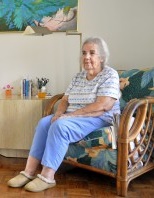Florida: A Day in Court for Marise London, an Elderly Jewish Woman

Marise London
It was much better than a breath of fresh air or a refreshing swim in the sea; for I could see real jurisprudence. Dissecting the word into its meaningful units, “juris” means judging, and “prudence” means with wisdom; but how often are the two actually combined into one?
Today, sitting in a Sarasota County, FL court as a spectator and an elder advocate for a lonely Jewish woman locked in guardianship in Florida year after year without due process that it rightfully due to her, I heard her new Probate judge press and press the battling lawyers in her case, drumming up thousands of dollars per hour in legal fees, to put her fate into perspective. While the lawyers, at least seven of them in the courtroom on August 6, 2015, were preoccupied with rules and laws, the presiding judge kept a keen eye on the greater purpose of the hearing, that being what best serves the needs of Marise London, artist, mother, and beloved elder to so many advocates who stand with her in her ardent quest for dignity and freedom from the human bondage of guardianship.
What else could you call a system in which precious human beings are deprived of their most basic rights in life and to life? A Ward of the State of Florida, where guardianship has become a major asset to the State and a tragic liability to the lives of its elders, is mentally, physically, and emotionally trapped in a network of professionals loyal to their livelihoods often more so than to the lives they are sworn to protect.
Guardianship is, in many respects, human trafficking, in which an elder is most commonly isolated from family and deprived of her rights to move and communicate freely according to her own choices. She cannot marry or write a check. She cannot contract or decide where she wants to live. She cannot select her doctor or refuse a specific medical treatment, psychotropic, or narcotic. She lives in isolation, subject to the will of her guardian, not of herself.
In a courtroom packed with Marise’s supporters, some of whom traveled hundreds of miles to advocate for her with their feet, a patient judge listened to lengthy proclamations of law for over an hour and then rightfully turned the entire focus of the hearing to Mrs. London, asking three crucial questions, the only ones that really matter: “Does Marise really need a guardian at all?” “Is there a less restrictive circumstance instead of guardianship that will meet Marise’s needs?” “Is there a better guardian available for Marise’s needs than the one she has had for years?”
The questions repeated by the judge a number of times were songs in my head because they were judging the fate of Marise prudently that she may face her future as the free woman she so truly deserves to be.

